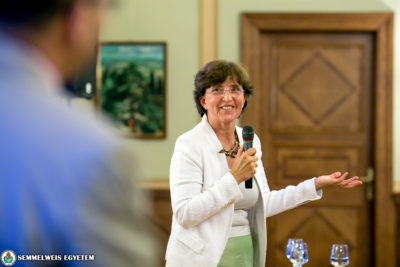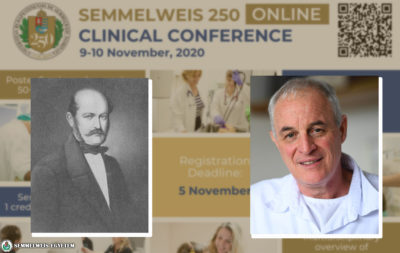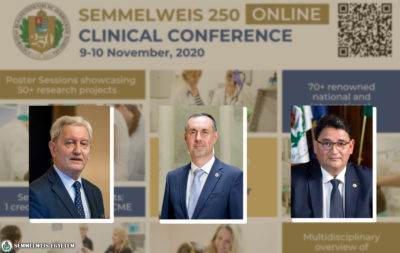Almost 600 participants attended the 1st Hungarian Scientific Mindfulness Conference at Semmelweis University. The all-day online program held on April 9 was organized by the Department of Clinical Psychology with the involvement of renowned and recognized professionals. Several physicians, psychologists, and representatives of other supportive professions joined the online event. In her opening speech, Dr. Dóra Perczel-Forintos, Head of Department, emphasized the importance of the event: even though international scientific mindfulness conferences have been organized for years, the current event “Mindfulness in the Service of Healing” is the very first in Hungary.

At the opening of the online conference, Dr. Dóra Perczel-Forintos, head of the department, emphasized that the staff are dedicated to healing, therefore the presentations of the conference mainly covered the application possibilities of mindfulness meditation in healing. She pointed out, however, that in the current pandemic situation, this effective method of reducing stress and anxiety may be of great help not only for health workers but for everyone.
The three main topics of the presentations covered three major areas of healing:
- Mindfulness plays a huge role in emotion regulation, which affects not only borderline personality disorders but also generalized anxiety disorders, therefore mindfulness can be widely applied in emotion regulation.
- The second large topic was pain and how the method of mindfulness can be applied to combat it.
- The third major topic was related to prevention, which included how mindfulness can be used in schools, including the issue of conscious parenting and childhood self-regulation.
In her opening speech, the head of the department drew attention to the importance of a complex approach to the topic. In addition to psychological factors, we also need to get acquainted with the neurobiological background of mindfulness and cognitive neuroscience research.
Dr. Dóra Perczel-Forintos emphasized that in the current epidemiological situation, it is especially important to pay attention to ourselves in addition to our daily work, to recognize our own coping strategies and everything with which we help others. She encouraged us to be compassionate with ourselves and to be grateful to others. At the end of her speech, a recent exercise, “Moments of Mindfulness,” suggested for mental health professionals, helped participants undergo the experience and positive effects of mindfulness meditation not only on a cognitive level but also emotionally and physically. She emphasized that this short exercise helps even when there is no opportunity to meditate for a long time, but we feel the need to regain our emotional balance.
Self-supporting professional material from the Department of Clinical Psychology
The Department of Clinical Psychology has prepared a short, effective self-supporting professional material, which may be applied anywhere. The material available on the department’s website includes, among other things, a few minutes of mindfulness exercises, short breathing exercises, stress-relieving tips and an audio material built on self-compassion. Furthermore, there is a material compiled on the web page for healthcare workers to treat anxiety related to the coronavirus epidemic. The department calls people’s attention to the fact that the third wave of the COVID epidemic causes a large mental and physical burden, more than ever before, therefore it is important to pay attention to ourselves: to notice and acknowledge our coping capacities and the efforts of our colleagues, to be compassionate with ourselves and to be grateful to others. The self-supporting material entitled “What can we do in difficult moments?” is available on the department’s website.
The opening presentation of the conference was held by Dr. Szabolcs Kéri, psychiatrist, head of the Gyula Nyírő National Institute of Psychiatry and Addictions, PhD lecturer at the university, who spoke about the neurobiological aspects of mindfulness. He emphasized that it is not easy to define what mindfulness is. Can it be more than a healing tool, can it be interpreted as some special psychotherapeutic technique, perhaps as a special kind of meditation, or as a desacralized rite, perhaps as a culture-shaping factor? He pointed out that both the metaphysical and ethical foundations of mindfulness are related to Buddhism, but they are already detached from it. He said that mindfulness can even play a role in counteracting the overflowing, clattering, noisy, stimulated environment of the consumer, information and technology society, since by focusing inward, staying in the present, we can rule it all out.
“This is a particularly important issue, because, perhaps nothing has broken into the cultural space with such force since psychoanalysis. Mindfulness may even be a backlash to the overheated nature of today’s information society. We need to snatch something from this wide range of phenomena that we can apply in healing and that also have a scientific basis”, Dr. Szabolcs Kéri highlighted.
Dr. Szabolcs Kéri’s presentation covered four main areas: the issue of defining mindfulness, the neural basis behind the phenomenon, and then the neural mechanisms in a broader, integrative neurophysiological model, which also covers the functioning of the body, and finally some practical applications.

The positive effects of mindfulness-based therapy on borderline patients, including a decrease in the number and intensity of self-harm, were reported by Dr. Dóra Perczel-Forintos and two clinical psychologists of the department, Szilvia Kresznerits and Ágnes Zinner-Gérecz. The relationship between mindfulness and empathy was described by Dr. Zsolt Unoka, associate professor of Semmelweis University’s Department of Psychiatry and Psychotherapy. Dr. Gabriella Vizin, psychotherapist held a presentation about her research entitled “Shame or compassion? The effect of childhood traumas on self-perception”, in which the therapeutic effects of developing self-compassion was emphasized. Dr. Veronika Udvardi spoke about the role of mindfulness in pain management, while Dr. Sándor Rózsa held a presentation entitled “Measuring mindfulness: how do Hungarians meditate?” Dr. Éva Szabó, head of the Institute of Psychology of the University of Szeged introduced the topic of the promising application of mindfulness at schools, meanwhile Dr. Mónika Miklósi described the positive effects of mindfulness skills on the parent-child relationship. Dr. Zsófia Garai-Takács held a presentation about the successful application of mindfulness-based interventions in the case of children.
Participants also had the opportunity to experience mindfulness in an experiential, guided meditation. Seeing the great professional interest, the organizers aim to create a tradition with the conference. They hope that from time to time, they will be able to share the results of their research and fresh knowledge in the field of mindfulness with each other and with those interested.
Source: Department of Clinical Psychology
Photo source: Attila Kovács, Semmelweis University
Illustration source: Department of Clinical Psychology
Translation: Katalin Illés-Romhányi


